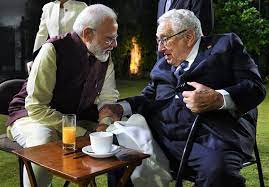
“Following Narendra Modi’s assumption of office as the Prime Minister of India in 2014, Kissinger, who served as the former US National Security Adviser, has consistently advocated for strengthened relations with India. Indeed, in recent years, he has earned a reputation as a staunch admirer of Prime Minister Modi.”
Washington: Henry Kissinger, renowned for his critical stance toward India’s leadership in the 1970s under Indira Gandhi, has passed away at the age of 100. However, the influential American statesman and former secretary of state had been actively promoting stronger US-India ties for the past decade under Prime Minister Narendra Modi.
Considered the architect of the US-China relationship since the early 70s, Kissinger died at his Connecticut home. The cause of his death was not provided by his consulting firm, Kissinger Associates.
Following Narendra Modi’s assumption of office as the Prime Minister of India in 2014, Kissinger, also the former US National Security Adviser, consistently advocated for robust ties with India. In fact, many assert that he became an avid admirer of Prime Minister Modi over the past few years.
Despite his ailing health, Kissinger, during PM Modi’s official state visit to the US in June of this year, traveled to Washington to attend the luncheon at the State Department, jointly hosted by Vice President Kamala Harris and Secretary of State Antony Blinken. Brought in a wheelchair to the historic Benjamin Franklin Room on the seventh floor of the Foggy Bottom headquarters of the State Department, he was greeted by US Ambassador to India, Eric Garcetti.
During the luncheon, the venerable American statesman, whose influence on American national security and foreign policy is considered immense, attentively listened to the prime minister’s speech and engaged in an interaction with him.
In June 2018, Kissinger expressed his views on India during a fireside appearance alongside John Chambers of the US India Strategic and Partnership Forum (USISPF) on the occasion of the organization’s first anniversary. Although the chat was closed to the press, attendees recall his strong advocacy for the India-US relationship.
“When I think about India, I admire their strategy,” remarked Kissinger during the rare appearance in Washington at the USISPF’s first annual leadership summit in June 2018.
While his ties with India soured in the 1970s during his tenure as the National Security Advisor and Secretary of State, Kissinger, before turning to China, initially preferred India. It was on his advice that the US Chambers of Commerce in the 70s established the US India Business Council (USIBC). As early as 1972, according to archival diplomatic conversations, he advocated for India and Japan to be permanent members of the UN Security Council.
Historians note that Kissinger and then-President Richard Nixon faced challenges in establishing a healthy relationship with then-Indian Prime Minister Indira Gandhi, leading them to turn their attention to China. However, after the Cold War and India’s emergence as a strong power in the last decade, Kissinger’s views on India evolved, and for successive administrations, he consistently advocated strong ties with India. Prime Minister Modi has had several meetings with him during his trips to the United States.
Speaking at another USISPF event, Kissinger, then 96, remarked that the Bangladesh crisis had brought the two countries to the “edge of confrontations.” In New Delhi, he stated, “India was at the beginning of a historic evolution, and not all the problems that concerned were of equal importance to India. India was heavily involved in its own evolution and the policy of neutrality.”
“If you look at the world, there are upheavals in almost every part of the world, and you cannot necessarily develop a general concept for each of them, but you can work together on the essentials of peace and progress. Then I would say no two countries are better situated now to evolve their friendship,” Kissinger added.
A day after Dhaka’s liberation on December 16, 1971, Kissinger informed then-President Nixon that he had “saved West Pakistan,” as revealed by declassified confidential papers from the US State Department.
After his meeting with Indira Gandhi in October 1974, a few months after India’s first nuclear test, Kissinger told then-President Gerald Ford that Gandhi had felt an “almost pathological need” to criticize the US but simultaneously desired an improvement in Indo-US relations on a “more equal” basis after Washington recognized India as an “important country in the world.”
While acknowledging that the then United States Republican administration had always wished for a man as ‘strong’ as Gandhi, Kissinger noted that Gandhi did not have a personality that appealed to Americans at ‘first blush.’
During a visit to Afghanistan and a meeting with Mohammad Daoud, the Head of State and Prime Minister, Kissinger shared views on India, non-alignment, and the personality of Gandhi. When asked by Daoud to characterize relations between India and the United States, Kissinger remarked, “I think it’s correct to say Mrs. Gandhi does not have a personality that appeals at first blush to Americans. Maybe not even at a second blush. There have even been cases of people who have resisted her a third time.”
“Our relations with India are friendly and aloof. It’s a fortunate thing the Indians are pacifists; otherwise, their neighbors would be worried. The first time we were in India, they told me that Kabul belonged to India too,” Kissinger stated, according to a White House Memo.
Kissinger, awarded the Nobel Peace Prize in 1973 for helping arrange the end of US military involvement in the Vietnam War, is also credited with secret diplomacy that facilitated President Nixon’s opening of communist China to the United States and the West, highlighted by Nixon’s visit to Beijing in 1972.
